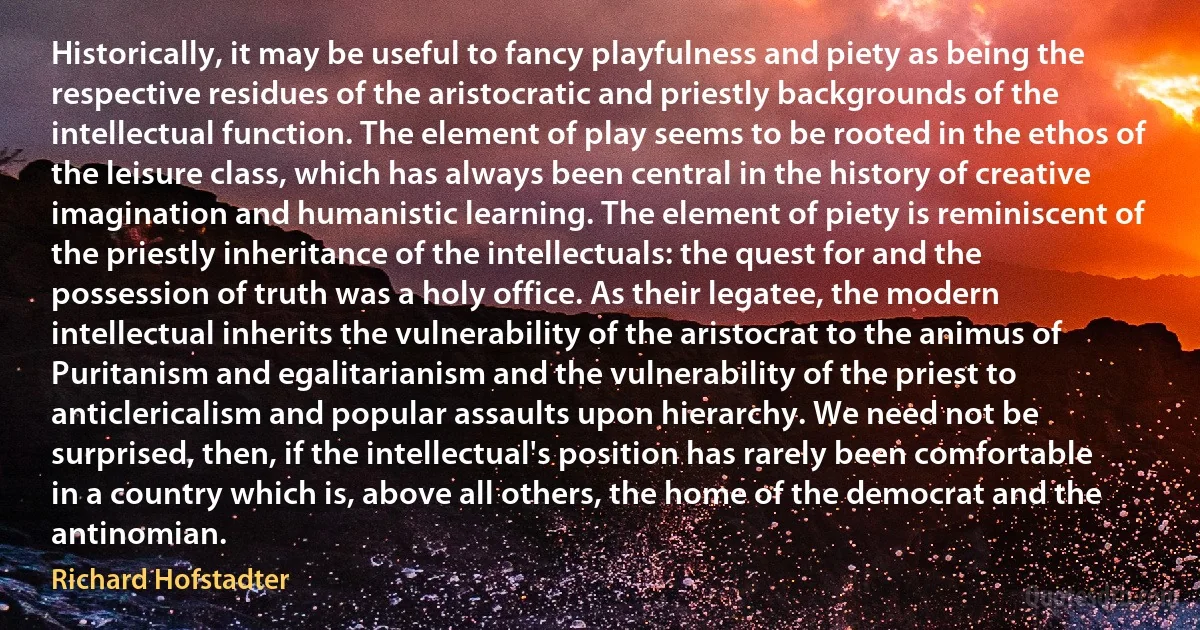
Historically, it may be useful to fancy playfulness and piety as being the respective residues of the aristocratic and priestly backgrounds of the intellectual function. The element of play seems to be rooted in the ethos of the leisure class, which has always been central in the history of creative imagination and humanistic learning. The element of piety is reminiscent of the priestly inheritance of the intellectuals: the quest for and the possession of truth was a holy office. As their legatee, the modern intellectual inherits the vulnerability of the aristocrat to the animus of Puritanism and egalitarianism and the vulnerability of the priest to anticlericalism and popular assaults upon hierarchy. We need not be surprised, then, if the intellectual's position has rarely been comfortable in a country which is, above all others, the home of the democrat and the antinomian.
Richard HofstadterRelated topics
above animus central country creative democrat element fancy hierarchy history holy home inheritance intellectual learning leisure need office play position possession priest puritanism reminiscent truth vulnerability others ethos playfulness egalitarianismRelated quotes
And so it is, seven years nearly after the War, that we yet see this prolonged and intensified depression, and this horrible figure of unemployment...We stand to-day at a point where, roughly speaking, one out of every ten of the insured population is out of work...But there is no direct remedy from the State alone. There can be no direct remedy by private men alone. Nothing can be done unless we can all pull together with a will. And I am-and I speak seriously-quite profoundly thankful that the Labour Party have been in office, and for this reason: that they now know that they, no more than any other Government, have been able to produce a panacea that would remedy unemployment. And in their hearts they must admit that they have no remedy which can be guaranteed to cure this disease and at the same time maintain unimpaired the international position and power of the British Empire.

Stanley Baldwin
If Christ were to walk in this world today, do you know what would happen to Him? He would be placed in a mental institution and given psycho-therapy, just as would His Saints. The world would crucify Him today just as it did 2000 years ago, for the world has not learned a thing, except more devious forms of hypocrisy. And what would happen if, in one of my classes at the university, I would one day tell my students that all the learning of this world is of no importance beside the duty of worshipping God, accepting the God-man who died for our sins, and preparing for the life of the world to come? They would probably laugh at me, and the university officials, if they found out, would fire me-for it is against the law to preach the Truth in our universities. We say that we live in a Christian society, but we do not: we live in a society.

Seraphim Rose
My image of a President before I came here, and before I had any hope of coming here, was that of a rubber-stamp President, to be frank. This is the image I got. But having come here, I find that the image is not quite correct. I thought, I will have lot of time, leisure for reading, writing, waking etc. But somehow I find I can't get it now. So, my image of a President is of a working President, not an executive President, but a working President, and working within the four corners of the Constitution. It gives very little direct power or influence to him to interfere in matters or affect the course of events, but there is a subtle influence of the office of the President on the executive and the arms of the government and on the public as a whole. It is a position which has to be used with the, what I should say, with a philosophy of indirect approach.

K. R. Narayanan
But someone is bound to question ... by what right I regard as Ideological State Apparatuses, institutions which for the most part do not possess public status, but are quite simply private institutions. As a conscious Marxist, Gramsci already forestalled this objection in one sentence. The distinction between the public and the private is a distinction internal to bourgeois law, and valid in the (subordinate) domains in which bourgeois law exercises its ‘authority'. The domain of the State escapes it because the latter is ‘above the law': the State, which is the State of the ruling class, is neither public nor private; on the contrary, it is the precondition for any distinction between public and private. The same thing can be said from the starting-point of our State Ideological Apparatuses. It is unimportant whether the institutions in which they are realized are ‘public' or ‘private'. What matters is how they function.

Louis Althusser
Novalis was cried down as an enthusiastic mystic by the prosaic, and Spinoza as godless by the literalists. It was incumbent upon me to protest against this view of Spinoza, seeing I would review the whole sphere of piety. Something essential would have been wanting in the ex position of my views if I had not in some way said that the mind and heart of this great man seemed deeply influenced by piety, even though it were not Christian piety. The result might have been different, had not the Christianity of that time been so distorted and obscured by dry formulas and vain subtilties that the divine form could not be expected to win the regard of a stranger. This I said in the first edition, somewhat youthfully indeed, yet so that I have found nothing now needing to be altered, for there was no reason to believe that I ascribed the Holy Spirit to Spinoza in the special Christian sense of the word.

Baruch Spinoza
